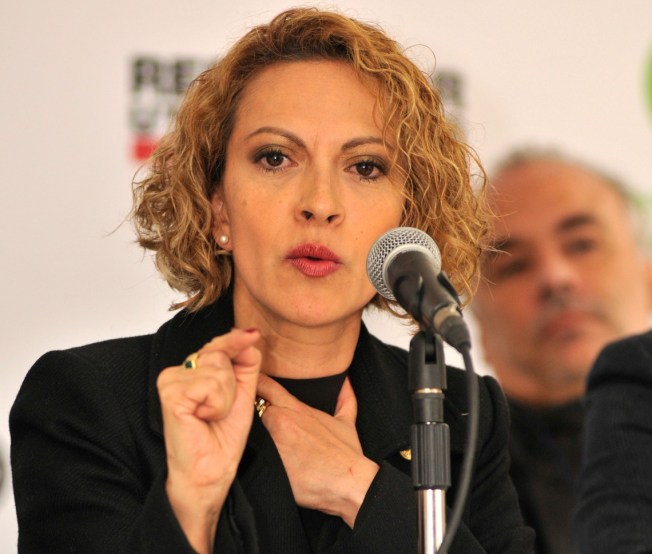CPJ prepares to host its 2021 awards ceremony
In just a few weeks, CPJ will host its 2021 International Press Freedom Awards ceremony, our annual celebration of journalists who put their lives on the line to bring us the news. Tune in to ipfa.cpj.org at 8 p.m. on November 18 to check out the show!
This year, we are honoring Guatemalan radio journalist Anastasia Mejía Tiriquez, Mozambican editor Matías Guente, and Myanmar editor Aye Chan Naing. We are also presenting our 2021 Gwen Ifill Press Freedom Award to Hong Kong media owner Jimmy Lai, who is currently imprisoned in China. (To read more about each awardee, check out ipfa.cpj.org.)
The event will be chaired by Ford Foundation President Darren Walker and will be hosted by David Muir, anchor of ABC’s “World News Tonight.” Those who attend in person will enjoy a special show by the Rough Cuts, featuring Lester Holt on bass!
See you soon!
Journalists Maria Ressa and Dmitry Muratov honored with the Nobel Peace Prize
CPJ was deeply thrilled to learn in early October that Rappler’s Maria Ressa and Dmitry Muratov of Novaya Gazeta were awarded the 2021 Nobel Peace Prize. The Nobel Committee lauded their “courageous fight for freedom of expression in the Philippines and Russia” and touted the necessity of freedom of expression as a precondition for democracy and lasting peace.
Muratov, who as editor-in-chief of Novaya Gazeta, one of the last independent newspapers in Russia, has been a persistent critic of Putin, received CPJ’s International Press Freedom Award in 2007. Ressa, who faces extreme threats in the Philippines as state-orchestrated attacks escalate against her and Rappler, was honored with CPJ’s Gwen Ifill Press Freedom Award in 2018.
IACHR says Colombia is responsible for attack on Bedoya

In October, the Inter-American Court of Human Rights ruled that Colombia was responsible for the 2000 abduction, rape, and torture of journalist Jineth Bedoya Lima and ordered the government to investigate, prosecute, and punish those responsible for the attack.
In May 2000, Bedoya was drugged and kidnapped at the gates of a Bogotá prison while reporting on paramilitary death squads for the daily El Espectador. The assailants bound and blindfolded her, then drove her to a town three hours away, where they beat and raped her, all while telling her in graphic detail about other journalists whom they planned to kill. The men left her on a highway, hours from Bogotá.
For more than a decade, Bedoya sought justice. “My last 15 years and six months have been a mixture of pain, anger, infinite love for my work, obstinacy, and, yes, hopelessness,” she wrote in the 2015 edition of CPJ’s annual publication, Attacks on the Press.
CPJ advocated for years for justice in Bedoya’s case. We wrote letters to the Colombian president calling for justice, covered the case in alerts and blogs, and published a special report in 2011, “The Silencing Crime: Sexual violence and journalists,” that highlighted Bedoya’s case. In 2015, we joined the Colombian group Fundación para la Libertad de Prensa (Foundation for a Free Press, or FLIP) for a meeting with the president, in which we urged him to address the high levels of impunity in attacks against journalists and called for progress to be made in Bedoya’s case. The president said he would prioritize the issue.
Then, in 2019, Colombian courts sentenced two of her attackers, all paramilitary fighters at the time of the attack, to prison. “It’s not a day of celebration,” Bedoya told CPJ after the convictions. “It’s a day of vindication.”
Colombian President Iván Duque tweeted that Colombia will “fully comply” with the decision in response to the announcement.
Must-reads
A feature by CPJ Europe Correspondent Attila Mong examines how journalists covering protests against COVID-19 safety measures are being called “terrorists,” “murderers,” and even “pedophiles.” “It is becoming unbearable,” one journalist said.
CPJ’s China correspondent describes how China’s pledges for press freedom around the Olympics in 2008 were worthless and, for the upcoming Winter Olympics in February, are simply absent.
CPJ Central America Correspondent Dánae Vílchez examines the deteriorating environment for press freedom ahead of the presidential elections in Nicaragua and outlines eight threats to watch as the country goes to the polls.
CPJ now accepts cryptocurrency
We are excited to announce that we are working with The Giving Block to accept cryptocurrencies like Bitcoin, Ethereum, Dogecoin, and more. Click here to find out more!
There are additional tax benefits when giving CPJ a highly appreciated asset. If you have any questions, please contact the Development department by email at [email protected] or by phone at 212-300-9025.
CPJ in the news
“Nobel prize underscores risks to journalists and democracy,” News Decoder
“Unsolved murders: Yet again, India is among 12 countries where killers of journalists can get away,” Newslaundry
“How this ship puts reporters in danger, and what Congress can do about it,” Columbia Journalism Review
“Media fight for justice, better protection in Malta,” VOA
“Violent abductions target Sudanese civilians in aftermath of coup,” The Guardian
“Student journalists say online harassment is a major issue,” Teen Vogue
“A Missouri newspaper told the state about a security risk. Now it faces prosecution,” Wisconsin Public Radio
“I was perceived security risk for taking #EndSARS protest pictures,” The Guardian Nigeria